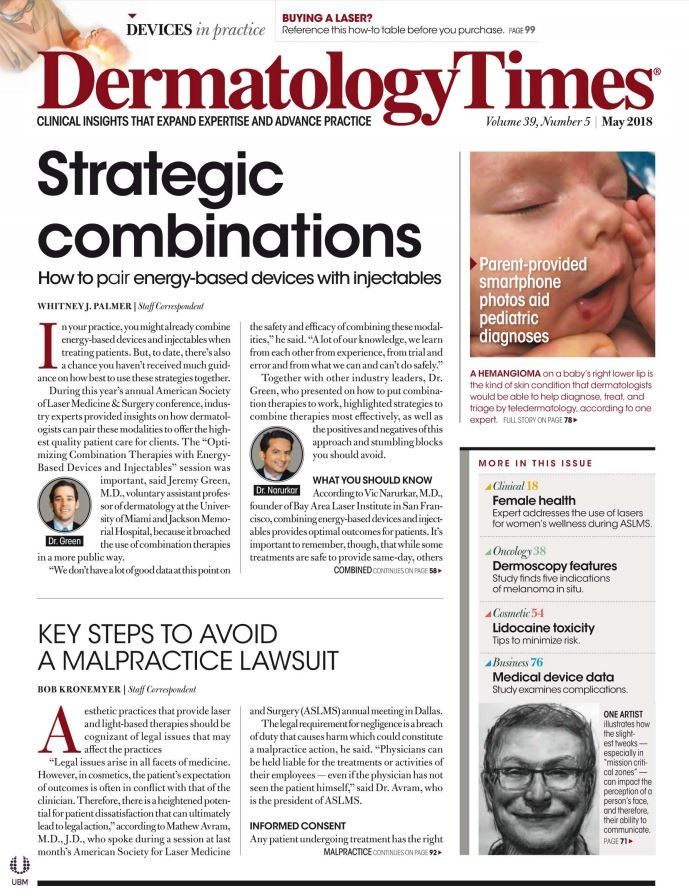- Case-Based Roundtable
- General Dermatology
- Eczema
- Chronic Hand Eczema
- Alopecia
- Aesthetics
- Vitiligo
- COVID-19
- Actinic Keratosis
- Precision Medicine and Biologics
- Rare Disease
- Wound Care
- Rosacea
- Psoriasis
- Psoriatic Arthritis
- Atopic Dermatitis
- Melasma
- NP and PA
- Skin Cancer
- Hidradenitis Suppurativa
- Drug Watch
- Pigmentary Disorders
- Acne
- Pediatric Dermatology
- Practice Management
- Prurigo Nodularis
- Buy-and-Bill
Publication
Article
Dermatology Times
Can I be sued for off-label use within standard of care?
Author(s):
Is it misuse to use medication for off-label uses? A patient sues after developing facial pain and other symptoms associated with the use of a topical for scabies. Is this physician guilty of practicing medicine outside the standard of care?
Several years ago, Dr. Bug treated an adult woman for scabies. At the time, the treatment of choice was lindane. Dr. Bug learned during his dermatology residency that one application of the medication was not usually effective and that adult patients should be treated with topical lindane for three consecutive nights. This particular patient was treated for two consecutive nights.
A few days later, the patient returned alleging many vague symptoms that she felt resulted from the use of the topical. The complaints were multiple including facial pain (that followed no nerve distribution), pain and areas of numbness. Soon after, the dermatologist was served with a multi-million-dollar lawsuit based on his “misuse” of lindane. The substance of the lawsuit was based on the Physician Desk Reference (PDR) emphasis on “...one application of lindane was usually curable...”
Dr. Bug has always been taught the jargon that is seen as a direct quotation contained within the PDR, states that once a medication was approved by the U.S. Food and Drug Administration, a physician could use the medication for other uses. Dr. Bug seeks legal help and is assured by his attorney that he will have no difficulty getting an expert witness to testify that his practice approach was consistent with the reasonable standard of care.
As the case progressed, the patient plaintiff was initially unable to secure an expert witness, or introduce any evidence from other physicians (ENT, Neurology), that concluded her symptoms were real, or had been caused by the lindane.
Dr. Bug’s attorney sought to have the case thrown out of court. At the last minute, the patient was able to secure an expert opinion, from a family practice physician, that initially stated that the plaintiff’s symptoms were caused by the lindane. Later, the expert retracted his views. But the damage had bene done. The case now progressed to trial without the plaintiff having an expert witness. Without an expert for the plaintiff, the plaintiff’s attorney used Dr. Bug as an expert witness against himself.
At trial, all the plaintiff’s attorney attempted to do was use the PDR as the standard of care, and for Dr. Bug to recognize the PDR as the standard of care, since the PDR stated that “....one application is usually curable...”. Therefore, the plaintiff’s expert concluded that Dr. Bug’s misuse of lindane was the cause of all of the patient’s symptoms.
This case actually did occur against a dermatologist in Texas (true name protected). Dr. Bug was the only witness called to testify other than the patient and her husband. Among other things, the plaintiff’s attorney attempted to introduce various text books, as the basis for the standard of care.
While Dr. Bug acknowledged that he was familiar with the text books, he did not recognize any one of them as the standard of care. He correctly stated that he used many sources of information, including training in dermatology, many years of practice, books, medical journals, and continuing medical education to arrive at the appropriate care and treatment of every patient.
Ultimately, five years after the initiation of the lawsuit, Dr. Bug won a verdict for himself. In the end, practicing within the standard of care generally protects us from losing a medical malpractice case. Unfortunately, it does not stop any patient and/or her lawyer from initiating a lawsuit.







